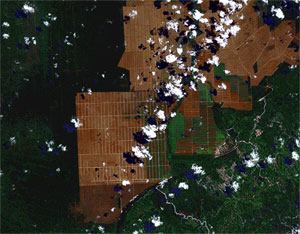Borneo rainforest to be protected; massive oil palm plantation canceled
Rhett A. Butler, mongabay.com
March 28, 2006
Today Indonesia announced its would end plans to establish a 1.8 million hectare oil plantation in the rainforest of Borneo. The proposed plan, which was backed by Chinese investments, would have destroyed one of the most biodiverse ecosystems on Earth. According to the World Wildlife Fund (WWF), some 361 species of animals have been discovered on the island in the past decade, including a mysterious fox-like creature spotted last year.
Indonesia, in partnership with the other governments that share the island of Borneo—Brunei Darussalam and Malaysia—made the announcement to protect the “Heart of Borneo” at the Convention on Biological Diversity, a United Nations-backed meeting presently underway in Curitiba, Brazil. The tri-country initiative aims to 220,000 square kilometers (85,000 square miles) of tropical rainforest across the island, which is home to such endangered animals as orangutans, forest elephants and rhinos.
“This is an historic event, as the Heart of Borneo initiative will pave the way towards expanding conservation of biodiversity, which fully supports the goal of the UN Convention on Biological Diversity,” said Dato Suboh, Secretary General of the Malaysian Ministry of Natural Resources and the Environment. “This initiative also represents a very significant milestone for transboundary cooperation and will enhance existing collaboration between our respective countries to protect vital natural resources and reduce poverty.”
 Orangutan in Kalimantan, photo by Rhett A. Butler. More pictures from Borneo |
Borneo, the third largest island in the world, was once covered with dense rainforests. With swampy coastal areas fringed with mangrove forests and a mountainous interior, much of the terrain was virtually impassable and unexplored. Headhunters ruled the remote parts of the island until a century ago.
In the 1980s and 1990s Borneo underwent a remarkable transition. Its forests were leveled at a rate unparalleled in human history—perhaps 80 percent of the island’s primary forest was lost since 1980. Borneo’s rainforests went to industrialized countries like Japan and the United States in the form of garden furniture, paper pulp and chopsticks. Initially most of the timber was taken from the Malaysian part of the island in the northern states of Sabah and Sarawak. Later forests in the southern part of Borneo, an area belonging to Indonesia and known as Kalimantan, became the primary source for tropical timber. Today the forests of Borneo are but a shadow of those of legend.
In recent years Borneo’s remaining forests had been cleared for oil palm plantations. Indonesia’s oil palm plantations grew from 600,000 hectares in 1985 to more than 4 million hectares by early 2006 when the government announced a plan to develop 3 million additional hectares of oil palm plantations by 2011. Oil palm (Elaeis guineensis) is an attractive plantation crop because it is the cheapest vegetable oil and produces more oil per hectare than any other oilseed. In the current environment of high energy prices, palm oil is seen as a good way to meet increasing demand for biofuel as an alternative energy source.
 Satellite view of palm oil plantations in Borneo. Image courtesy of Google Earth. |
When the Indonesian government announced plans to significantly expand oil palm acreage in Borneo it met strong condemnation by environmental groups, especially WWF, which produced a number of reports that revealed the island’s striking biodiversity. WWF’s findings also likely played a part in Malaysia’s recent decision to phase out logging in more than 200,000 hectares of key forest habitat in the Bornean state of Sabah.
WWF says that this new initiative is an important step to safeguarding the biological diversity of Borneo while providing opportunities for economic activities that provde for local people without diminishing the forest resource base.
“WWF considers the Heart of Borneo to be one of its top global priorities,” added Leape. “It is hugely important to maintain a large enough area of Borneo’s forests for the survival of the natural ecosystems. This is critical for sustainable development, and WWF stands ready to assist Borneo’s three governments with technical and financial support, so that we can make the conservation vision a reality.”